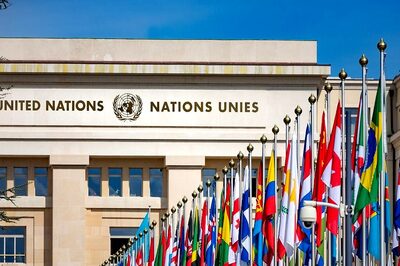
views
It is quite rare for an organisation to reach its zenith in its centennial year. The Rashtriya Swayamsevak Sangh (RSS), the largest non-governmental organisation in the world, entered its centennial year this Vijayadashami, on October 12. The organisation has become deeply ingrained in India’s social and cultural landscape, with daily shakhas held at thousands of locations across the country and beyond.
With the prayer Namaste Sada Vatsale Matribhume, the scope, power, and influence of the Sangh continues to grow, despite facing significant opposition and obstacles. The critics of the Sangh have imposed bans on it three times—in 1948, 1975, and 1992—but on each occasion, the bans were lifted unconditionally. In all three instances, the Sangh emerged stronger than before, which is why it remains a topic of widespread discussion. The RSS has been instrumental in preserving and promoting India’s rich cultural heritage. In an era of rapid globalisation, the Sangh’s efforts to safeguard indigenous traditions are more relevant than ever.
The basic unit of the RSS is its branches, which combine a sense of ‘self’ with a sense of larger social interest. The true strength of the RSS lies in its self-motivated workers, known as volunteers. A volunteer is defined as a self-motivated and self-driven individual. Through the service, contact, and publicity department of the Sangh, volunteers engage in social awareness initiatives to reach remote communities.
In its 100th year, the RSS’s influence is not only widespread but also active across 40 countries, including India. Over the past century, the RSS has transformed into a vast banyan tree with 73,000 shakhas. Today, its network is so robust that it will be very challenging to dislodge its influence over various aspects of Indian politics and society in the future. The Sangh has a wing dedicated to every section of society, and there are now more than 80 like-minded or affiliated organisations within the Sangh Parivar.
The RSS, a socio-cultural organisation, was founded by Dr Keshav Baliram Hedgewar in 1925 on the auspicious occasion of Vijayadashami (27 September). The first Sarsanghchalak of the Sangh, Hedgewar, planned its formation during a seminar at his home. Vishwanath Kelkar, Bhauji Kavre, Anna Sahne, Balaji Huddar, and Bapurao Bhedi were among those present at this meeting. The organisation received its current name, Rashtriya Swayamsevak Sangh, approximately six months after its establishment. On April 17, 1926, Dr Hedgewar convened a meeting at his home, attended by around 26 volunteers. A detailed discussion ensued to decide the organisation’s name, during which everyone contributed their ideas. After considerable deliberation, the name ‘Rashtriya Swayamsevak Sangh’ was unanimously selected.
The first daily shakha of the RSS officially commenced on May 28, 1926, with Dr Hedgewar advancing the Sangh’s work through gymnasiums and akharas. He envisioned a healthy and fit volunteer force. Its emphasis on physical fitness, moral values, and national pride has resonated with millions, making it the largest voluntary NGO in both India and the world. Today, more than 5 million volunteers of the Sangh attend the shakhas regularly. PM Modi himself was a full-time member of the RSS before transitioning to the BJP.
With the inspiration and support of the Sangh, various organisations operate in every sector of society, contributing to nation-building. Indian thought is reflected in the functioning of the Sangh. The organisation emphasises the continuous process of making the entire personality of the volunteer beneficial to society. Many scholars worldwide have studied the RSS and described it as an organisation with a unique and distinct methodology.
Different types of celebrations are typically held to mark the completion of 100 years for any social organisation or political party in the world. However, there has been no celebration for the centenary of the world’s largest social organisation. Sarsanghchalak Dr Mohan Bhagwat has clearly stated that there is no need to boast about achievements; instead, we must focus on reforms that will benefit society, and regardless of the circumstances, RSS volunteers should continue their work.
As the RSS prepares to celebrate its 100th anniversary, it has set a target of reaching every block in the country and increasing the number of shakhas to 100,000. A full-time worker within the organisation is referred to as an evangelist. These individuals do not live with their families and dedicate all their time to organisational work. The RSS plans to significantly increase the number of workers by encouraging them to commit at least two years of their lives as pracharaks. This initiative is expected to provide a substantial boost to the organisation.
The RSS is distinguished by its commitment to promoting social cohesion and nation-building. In a vast and diverse country like India, fostering mutual understanding and maintaining social harmony through collective efforts is crucial. It is evident that the RSS has made significant strides in this regard. Over the past century, the Sangh’s volunteers have held esteemed positions within the nation while exhibiting great humility, and the organisation has progressed in its pursuit of national interest and social unity without any sense of yearning.
The author is historian and founder of ‘Itihas Kumbh’, Varanasi. He tweets @DKauntey. Views expressed in the above piece are personal and solely those of the authors. They do not necessarily reflect News18’s views.



















Comments
0 comment